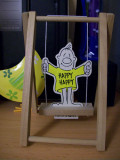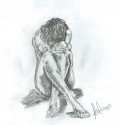Bipolar Disorder: The Struggle is Real
The Facts
Bipolar disorder is a mood disorder and mood disorders involve disabling disturbances of emotion. There are two types of bipolar disorder. Type 1 involves full blown mania. The mania may induce feelings of euphoria, other times it may manifest as uncontrollable rage. Someone in a manic episode tends to take things to extremes, such as promiscuity or overspending. The results are shame, guilt, and self-loathing. People with type 1 bipolar disorder may or may not suffer from depression and mixed stages, although they usually do.
Type 2 bipolar disorder is marked by periods of depression, hypomania, and mixed stages. Hypomania is a milder form of mania. Mixed stages involve symptoms of both hypomania and depression. Depression is usually the prevalent symptom of type 2 bipolar disorder.
About two-thirds of people diagnosed with bipolar disorder also meet the criteria of an anxiety disorder. One in every four people with type 1 bipolar disorder and one in every five of type 2 bipolar disorder have attempted suicide at least once.
There is another condition related to bipolar disorder. Cyclothymic disorder is marked by the highs and lows of bipolar disorder, with rapid cycling, but without the severity of symptoms.
The Struggle
Having bipolar disorder involves more than seeing a psychiatrist and taking medication every day. Medication that works for one patient may not work for another. It takes trial and error to find the combination that works best. Meanwhile, the patient struggles with moods, relationships, bills, or whatever mess his or her condition gets them into. A total of 73% of women inmates and 55% of male inmates in state prisons have a serious mental illness, including bipolar disorder. Untreated bipolar disorder can have devastating consequences.
Once a bipolar patient and his or her doctor find a medication cocktail that works, there are other issues to deal with. No medication works perfectly all the time.The bipolar patient still struggles with mood swings, sometimes losing control. They do things that they regret, feel shame and guilt, develop low self esteem. Someone with bipolar disorder needs to build a support system, which can be difficult if he or she has alienated everyone. Patients, especially those with type 2 may feel suicidal. The patient will usually need to work on developing coping skills, and often needs therapy. And, then there is the self-medicating.
Not much is scarier than a drunk bipolar patient, whether or not he or she is taking his or her medication. Alcohol and drugs can make anybody unpredictable, but more so a person with bipolar disorder. People with bipolar disorder should stay away from alcahol and other drugs.
In Conclusion
Most people know at least one person with bipolar disorder. Try to remember that the mood swings, and sometimes the behavior, is not his or her fault. He or she won't always be this way. If he or she is not seeking help now, eventually he or she will be forced to. If a loved one is bipolar, give support to the best of your ability. And remember, the struggle is real.








